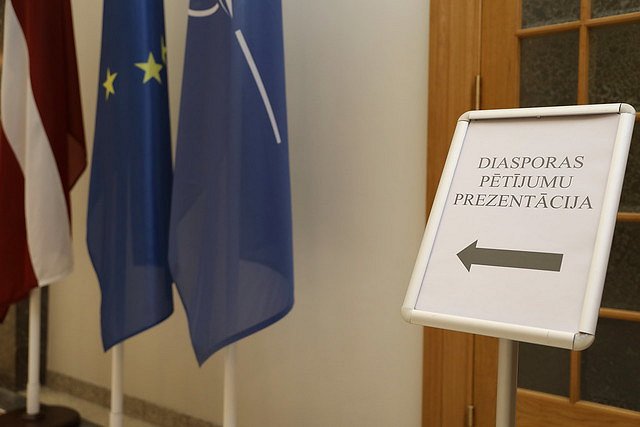The Ministry of Foreign Affairs (MFA) held a presentation of the latest diaspora research produced by the University of Latvia's Diaspora and Migration Center (LU DMPC) .
The event was opened by Zanda Kalniņa-Lukaševica, Parliamentary Secretary of the Ministry of Foreign Affairs, who said: “Being aware of the growing importance of diaspora issues, the Diaspora and Migration Research Center was established in 2014 with the support of the Ministry of Foreign Affairs. During these years, several diaspora-themed studies have been conducted.
With the adoption of the Diaspora Law, we can safely say that this is one of the privileged areas in which policy is based on academic research."
The latest research makes for interesting reading. According to a report from Baiba Bela and Inta Mieriņa, around 15% of Latvia's population currently lives abroad and offers opportunities in three areas: people, finance and knowledge.
Approximately 20,000 people leave Latvia each year, with 17,700 departing in 2017. Since 2013, 5,300–6,500 emigrants have returned to Latvia each year, according to official statistics. The research conducted so far shows that almost half of all emigrants have left Latvia several times, and many of those who have returned have plans to go away again, creating a very fluid situation that is hard to track with precision.
In 2017, remittances sent to Latvia totaled more than 800 million euros. 34% of diaspora members regularly and 38% sometimes financially support relatives in Latvia. In total at least 30% of households in Latvia receive some sort of financial support from their relatives overseas.
Visits to Latvia from diaspora members also boost tourist figures, the report says, to the tune of "tens of millions of euros" every year, but they also act as effective marketing and advertising reps, spreading the word about what Latvia has to offer.
Similarly, the expertise and education diaspora members gain abroad makes them more active in founding companies and other forms of economic activity than the average resident, the research suggests, while absence from their homeland also tends to make the majority of them likely to participate in cultural, political and other activities linked to Latvia.
Another report, by the eminent academic Mihails Hazans, examines the question of re-emigration - attracting or encouraging expatriates to return to Latvia, which is regarded as important to meet future labor demand as well as for other social reasons.
A crucial factor in this is the quality of work they can expect to do when and if they return: "Satisfaction with work has a positive and very significant impact on the likelihood of both re-emigrants of both sexes staying in Latvia in the near future or in the long term, as well as the likelihood that a decision to return is judged to be correct," the report says.
Other main concerns include a lack of uncertainty about the tax and pensions regimes they will face when and if they return, plus worries that the Latvian health service may not be as reliable as those in other countries of residence, the report suggests.
In short, the fear of earning less money and having a lower quality of life is what prevents many people returning despite an emotional attachment to the country - if such issues as those can be tackled, the prospect of seeing more returnees is likely.
The full research is available at the University of Latvia's website, though only in Latvian at present.


































